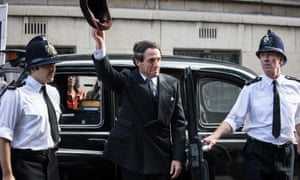Senior Labour politicians knew about Liberal leader Jeremy Thorpe’s relationship with Norman Scott for a decade and a half before it became public in the mid-1970s, but orchestrated a cover-up amid fear that it would be exploited by foreign intelligence agencies, according to a newly unearthed memo.
The revelation will reignite speculation about the extent to which the establishment sought to protect Thorpe, even during his trial for conspiracy to have Scott murdered, which was dramatised in the BBC’s A Very English Scandal, starring Hugh Grant.
Peter Hain, then a well-connected Labour activist, now Lord Hain of Neath, wrote a private memo in July 1978 – shortly before Thorpe was charged – that was copied to several senior Labour politicians, including Tony Benn and Neil Kinnock.
Suggesting, correctly, that Thorpe was about to be charged, Hain told his Labour colleagues that he had seen evidence that there was “indeed” a plot to murder Scott “and that its principal instigator was Jeremy Thorpe, working through his close friend David Holmes (the best man at Thorpe’s first wedding).”
At the time Hain wrote the memo, the Liberal party had agreed to a pact to prop up the Labour government, and there were concerns that a Thorpe trial could damage both parties, to the benefit of the Tories.
Hain warned: “The Labour party and its leadership ought to consider this all very quickly but there must be no pressure for a further cover-up on electorally expedient grounds.”
The memo, marked private and held in the National Archives, explained: “There is also clear evidence that leading politicians over the past 15 years, together with civil servants, the police and the security services, have been party to a cover-up surrounding the affair. Most of the politicians involved are Labour.”
Last week, the Observer reported that Scott believed there continued to be a widespread cover-up of his relationship with Thorpe and the apparent plot to murder him.

Hain’s memo stated: “It is likely that a number of leading Labour politicians – eg Harold Wilson, Barbara Castle, Alice Bacon etc will need to be interviewed by the police in order to fill in the political background to the cover-up, even if they may have no direct role in it.”
The memo eventually made its way to the prime minister, Jim Callaghan, who asked his officials to look into allegations that members of the Wilson government had examined Scott’s social security file for evidence to corroborate his claims that he had been in a relationship with Thorpe, including one that the MP had paid his national insurance contributions.
Wilson feared that South Africa’s Bureau of State Security, known as Boss, had collected information about his friend Thorpe, a critic of apartheid, that could be used to blackmail him or ruin his career.
“I think Wilson was genuinely trying to help Thorpe,” Hain told the Observer. A journalist, Gordon Winter, who worked for Boss, had interviewed Scott and had enough material to destroy Thorpe. He eventually published a lengthy account of Scott’s relationship with Thorpe, albeit after the scandal broke.
Hain, a prominent opponent of apartheid, had concerns about Boss that were later justified when, in 1987, former MI5 officer Peter Wright confirmed in his book Spycatcher, that there had been a plot by the South African security services to disrupt the UK’s Liberal and Labour parties – both trenchant critics of apartheid.
“The South African security services worried that there would be a Lib-Lab pact and wanted to undermine that prospect,” Hain said. “The fact that it [the pact] happened showed their fear was a real one.”
But Hain’s memo concluded that attempts by the Labour left to continue covering for Thorpe could not continue, given “what is in effect not just a criminal but a political conspiracy”.